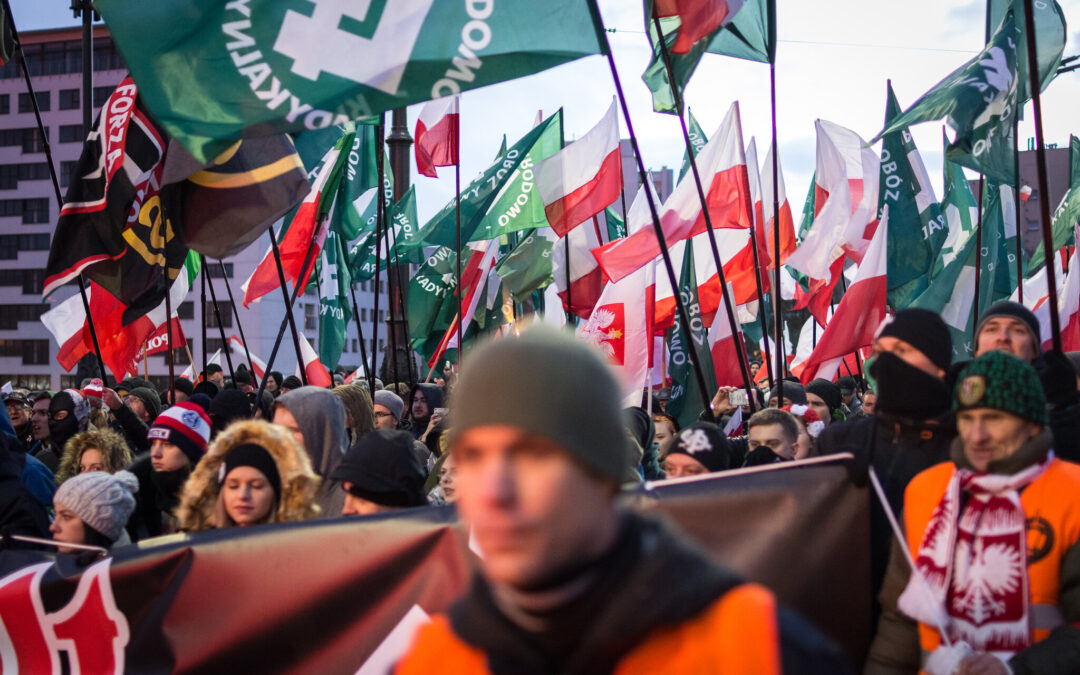Keep our news free from ads and paywalls by making a donation to support our work!

Notes from Poland is run by a small editorial team and is published by an independent, non-profit foundation that is funded through donations from our readers. We cannot do what we do without your support.
The municipal authorities in Warsaw have refused permission for the main annual march marking Poland’s Independence Day on 11 November to go ahead this year. It says that the organisers improperly submitted applications to register the gathe
A spokesman for the event – which is organised by far-right groups but attracts tens of thousands of participants, many of whom are mainstream conservatives – has confirmed that they will appeal against the decision. The interior minister says he believes the march will eventually be able to go ahead.
Marsz Niepodległości bez zgodny na zgromadzenie 11 listopada #Wyborcza @GazetaStoleczna https://t.co/h4qsdPE1pv
— Gazeta Wyborcza.pl (@gazeta_wyborcza) October 14, 2024
On Monday, city hall announced that it had refused to grant a permit for the Independence March to take place. It said that organisers had submitted a series of applications for the event that were each “practically identical” apart from listing different starting dates, reports broadcaster TVN.
Even though the march takes place on 11 November, each of the applications listed multiple days that the event would take place. The first, for example, submitted on 28 September, said it would last from 9 p.m. on 28 October to 1 a.m. on 12 November.
City hall believes this was a tactic by the organisers to gain an “advantage” over other potential events that could take place in Warsaw on 11 November. It allowed the Independence March application to be made as early as possible because such gatherings can only be registered a maximum of 30 days in advance.
The municipal authorities also said that assessments by the police, fire and emergency medical services, as well as the public transport authority, found that the details outlined in the applications – for gatherings lasting up to 16 days – would “have a very negative impact on the functioning of the city”.
Following the city’s announcement, a spokesman for the association that organises the Independence March told the media that they would “appeal against the decision, which violates the will of tens of thousands of patriots who want to celebrate the regaining of independence”.
The organisers have the right to file an appeal with the district court in Warsaw. In 2021, the city also sought to prevent the event from taking place, and received the backing of courts for its decision.
But it eventually went ahead anyway after the then government, led by the national-conservative Law and Justice (PiS) party, intervened to make the march an official state event, thereby allowing it to take place.
We are at "war with Germany and the EU", declared the organiser of today's Independence March in Warsaw, which was made an official state event by the government for the first time
The march passed peacefully, though with xenophobic and anti-LGBT rhetoric https://t.co/cGf5fekluR
— Notes from Poland 🇵🇱 (@notesfrompoland) November 11, 2021
However, this year’s Independence March is the first to take place since PiS was removed from office last December and replaced by a more liberal ruling coalition led by Donald Tusk and his Civil Platform (PO) party. The mayor of Warsaw, Rafał Trzaskowski, is a deputy leader of PO.
On Monday evening, Mariusz Błaszczak, the head of PiS’s parliamentary caucus, condemned Trzaskowski for the decision to refuse permission for the march.
“No one will take away the right of Poles to celebrate Independence Day,” tweeted Błaszczak. “The march will go ahead regardless of Trzaskowski’s prohibitions.”
Warszawski ratusz z Rafałem Trzaskowskim na czele ZAKAZAŁ MARSZU NIEPODLEGŁOŚCI‼️
11 listopada widzimy się wszyscy w Warszawie. Bo Polska to my… 🇵🇱 pic.twitter.com/GuliIY57Si
— Marsz Niepodległości (@StowMarszN) October 14, 2024
In fact, interior minister Tomasz Siemoniak, who is also from PO, likewise expressed his belief that the march should, and in the end will, go ahead.
“We have the freedom to demonstrate, let it pass in peace,” Siemoniak told broadcaster TVP on Tuesday morning. “It should happen on rational terms – I don’t know why someone is planning it for 16 days – so I am confident that, at the end of the day, this march will take place and no one will violate the right to demonstrate.”
“But it is important that the organisers of the march make sure that everything takes place in peace, calm and without aggression,” added the interior minister. In some previous years, the march has seen violent scenes, including attacks on property and police. However, at other times it has passed peacefully.
Last month, police raided and searched properties linked to the march as part of an investigation into suspected crimes committed during the event when it took place in 2018.
Opposition leader Jarosław Kaczyński has condemned police searches of properties linked to the annual Independence March.
He claims that it is "an attempt to pacify a country that is to be deprived of independence" and brought under foreign rule https://t.co/avJc6tYw4e
— Notes from Poland 🇵🇱 (@notesfrompoland) September 5, 2024

Notes from Poland is run by a small editorial team and published by an independent, non-profit foundation that is funded through donations from our readers. We cannot do what we do without your support.
Main image credit: TG Sokół Lublin/Flickr (under CC BY-NC-SA 2.0)

Daniel Tilles is editor-in-chief of Notes from Poland. He has written on Polish affairs for a wide range of publications, including Foreign Policy, POLITICO Europe, EUobserver and Dziennik Gazeta Prawna.



















